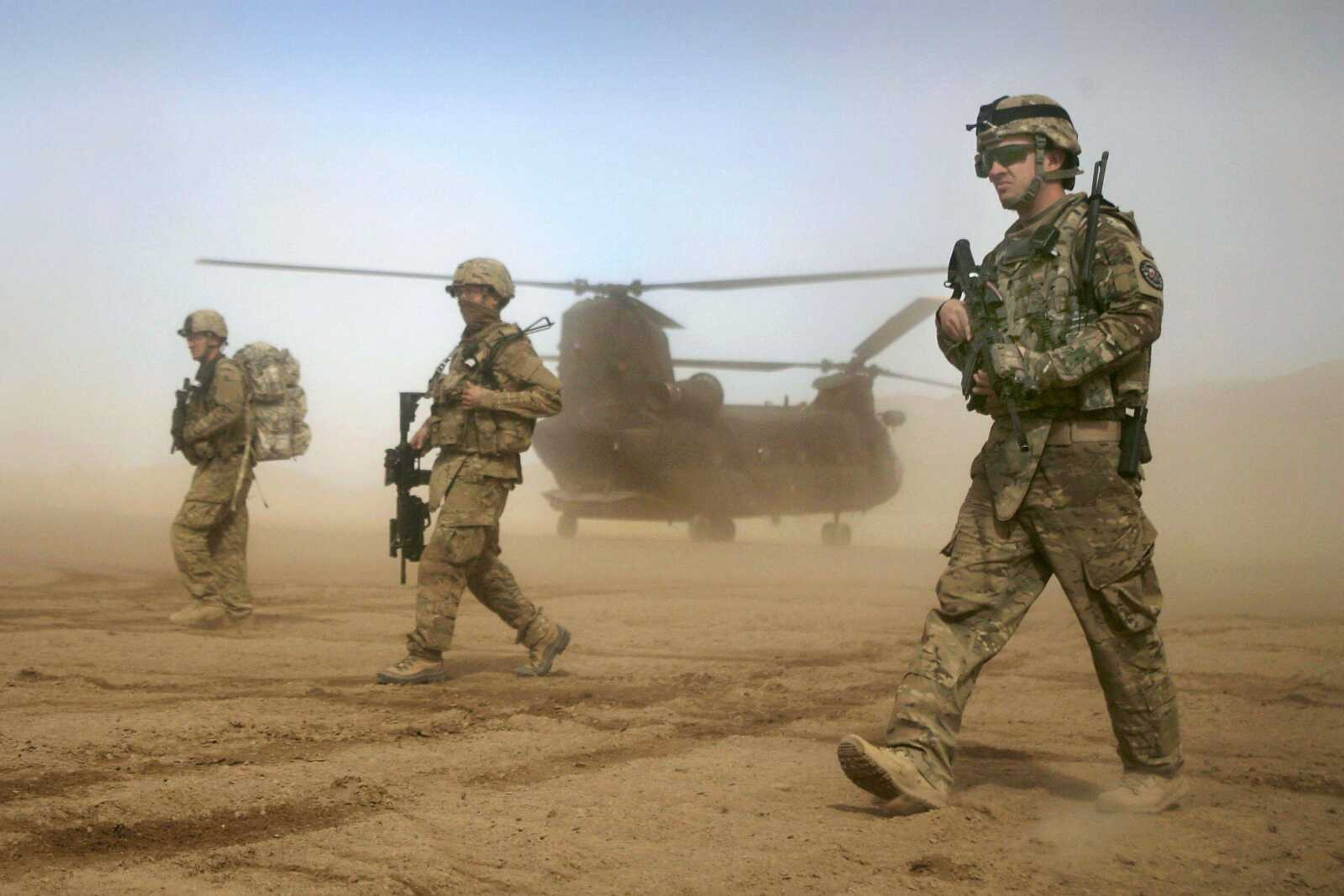Panetta: U.S. combat role in Afghanistan ending in 2013
BRUSSELS -- Defense Secretary Leon Panetta laid out the administration's most explicit portrayal of the U.S. drawdown in Afghanistan, saying Wednesday that U.S. and other international forces in Afghanistan expect to end their combat role in 2013 and continue a training and advisory role with Afghan forces through 2014...
BRUSSELS -- Defense Secretary Leon Panetta laid out the administration's most explicit portrayal of the U.S. drawdown in Afghanistan, saying Wednesday that U.S. and other international forces in Afghanistan expect to end their combat role in 2013 and continue a training and advisory role with Afghan forces through 2014.
Panetta's remarks to reporters traveling with him to a NATO defense ministers meeting in Brussels showed how the foreign military role in Afghanistan is expected to evolve from the current high-intensity fight against the Taliban to a support role with Afghans fully in the lead.
The timeline fits into the U.S. political calendar, enabling President Barack Obama to declare on the campaign trail this year that in addition to bringing all U.S. troops home from Iraq and beginning a troop drawdown in Afghanistan, he also has a target period for ending the U.S. combat role there.
It also serves to possibly bridge an apparent gap between France and the rest of the NATO partners of the U.S. on defining the end game in Afghanistan.
All NATO members in November 2010 endorsed a plan to keep forces in Afghanistan until the end of 2014. But France this week appeared to throw that plan into doubt when President Nicolas Sarkozy proposed, with Afghan President Hamid Karzai at his side and seemingly in agreement, that NATO end its mission in 2013, one year earlier than planned.
Sarkozy also said, however, that France would provide support for the training of Afghan forces beyond 2013, so his approach might not be entirely different from the one Panetta outlined in which allied troops shed their combat role in the second half of 2013 but remain through 2014 to train, advise and assist.
Panetta said he hoped to hear more from the French delegation at the NATO talks today and Friday.
Panetta called 2013 a critical year for the Afghanistan mission that has dragged on for more than a decade with little sign that the Taliban will be decisively defeated. He noted that NATO and the Afghan government intend to begin a final phase of handing off sections of the country to Afghan security control in mid-2013.
"Hopefully by the mid to latter part of 2013 we'll be able to make a transition from a combat role to a training, advise and assist role," he said. He added that this "doesn't mean we're not going to be combat-ready," but rather that the U.S. and other international forces will no longer be in "the formal combat role we're in now."
Panetta said the administration wants to make sure that the Afghan forces, after foreign troops depart, are "sufficient and sustainable" but noted that will require continuing financial support.
"One of the things we'll be discussing [in Brussels] is what the size of that [Afghan] force should be, but a lot of that will be dependent on the funds that are going to be put on the table in order to sustain that force," he said.
A senior defense official traveling with Panetta said the U.S. believes Afghanistan will not need as big a force as is now being built. NATO has set a target of 352,000 Afghan soldiers and police. The official, who spoke on condition of anonymity under ground rules set by the Pentagon, said the U.S. thinks a smaller force would be adequate, but he would not be more specific.
Panetta is gathering with his European counterparts at a delicate time for NATO, not only because of the uncertainty surrounding the military mission in Afghanistan but also because of a growing gap in military power between the U.S. and nearly all other European members of the alliance.
That chasm is not expected to narrow even as the U.S. reduces its defense budget by nearly $490 billion over the coming decade and reduces the size of the Army and Marine Corps.
The U.S. remains the leader of a 28-nation NATO, but the Obama administration has made no secret of its intention to shift focus toward Asia and the Middle East. It announced last week that it will remove two Army brigades from Europe in the next two years, leaving one in Germany and one in Italy. The alliance also is quietly discussing the possible withdrawal of American nuclear weapons from Europe in coming years. The nuclear issue is on the agenda for the Brussels meeting.
Gen. Ray Odierno, the Army chief of staff, said last week that the two brigades being removed from Europe will be eliminated rather than reassigned to U.S. bases. Both are based in Germany -- the 172nd Infantry Brigade, in Grafenwoehr, and the 170th Infantry Brigade, in Baumholder. Odierno said that in the long run this change will benefit both the United States and its European partners because U.S. Army combat and support units will periodically rotate in and out of Europe for training and joint exercises that are designed to meet the needs of the European forces.
Connect with the Southeast Missourian Newsroom:
For corrections to this story or other insights for the editor, click here. To submit a letter to the editor, click here. To learn about the Southeast Missourian’s AI Policy, click here.









